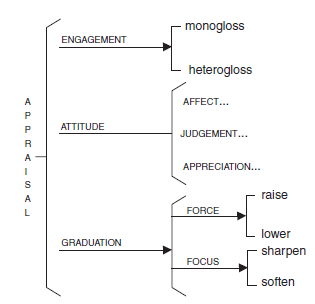Critical argument – the evaluative stance in academic writing
“Critical thinking” has always been the pre-requisite for academic writing at the tertiary level, while such pre-requisite is found to be scant in students’ work (Hood, 2004). Explanations to the reasons for such a lack include
- failure to adopt a position to establish an evaluative stance,
- unwillingness to be critical due to lack of confidence and
- conventional pedagogy in secondary education failing to encourage critical thinking in students’ writing (Groom, 2000, Hood, 2004, Hyland & Milton, 1997).
Meanwhile, traditional pedagogy has always focussed on objectivity in terms of tone, use of field-specific lexis (jargons) and complex sentence structure.
Structuring the writer’s position and voice to make the evaluation of the topic or issue explicit is thus necessary in academic writing. In this section, Appraisal system by Martin and Rose (2007) will be drawn upon. Appraisal system is further divided into three subcategories: engagement, attitude and graduation. The model of Appraisal system is shown in Figure 1:
 |
Note:
|
Figure 1. Appraisal system
In the next sessions, the three subcategories of the Appraisal system are briefly defined and their contributions to the evaluation in academic writing are exemplified. Click on the following links to look at the subcategories in detail:
- Attitude: Affect, Judgement, Appreciation
- Engagement: Proclaim, Disclaim
- Graduation: Force, Focus
Please also read the summary and the sample text after reading the tutorials about the Appraisal System.
Hood, S. (2010). Appraising Research: Evaluation in Academic Writing. UK: Palgrave MacMillan.
Martin, J.R. (2000). Beyond Exchange: Appraisal Systems in English. In S. Hunston & G. Thompson (Eds.) Evaluation in Text: Authorial Stance and the Construction of Discourse (p. 143-175). New York: Oxford University Press.
Martin, J.R. & Rose, D. (2003). Working with Discourse: meaning beyond the clause. London: Continuum.
Martin, J. & White, P.R.R. (2005). Language of Evaluation: Appraisal in English. London: Palgrave MacMillan.
Swales, J. (1990). Genre analysis: English in academic and research settings. England: Cambridge University Press.

